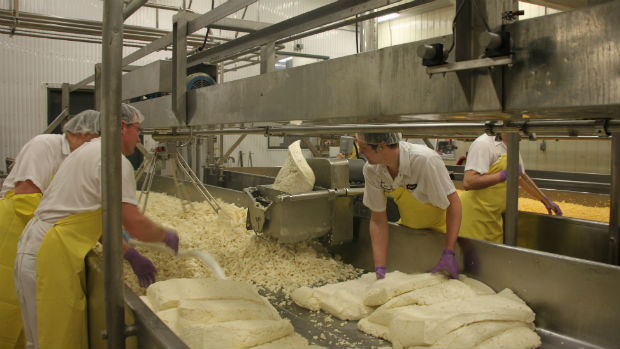An In-Depth Appearance at Cheese Manufacturing: Components, Techniques, and the Future of Artisan Cheeses
The complex procedure of cheese manufacturing is an interesting convergence of art and science, where high-quality milk, rennet, and certain microbial cultures serve as foundational aspects. As the market significantly focuses on sustainability and openness, the future of artisan cheeses guarantees to show both heritage and development.
Trick Components in Cheese Production
A range of essential ingredients play a critical role in cheese production, each adding to the last item's taste, appearance, and personality. The main component in cheese is milk, which can come from different resources, consisting of cows, goats, and lamb - cheese for sale online. The kind of milk used dramatically influences celebrity's preference and consistency; for example, cow's milk commonly produces creamier cheeses, while goat's milk often produces tangy selections
An additional vital component is rennet, an enzyme made use of to curdle the milk, dividing it into curds and whey. The resource of rennet can be animal, vegetable, or microbial, each imparting unique features to the cheese. Cultures, containing certain stress of microorganisms, are additionally integral to the cheese-making procedure. They ferment lactose right into lactic acid, helping in flavor development and structure.
Salt not only enhances the taste yet also serves as a preservative, hindering the development of unwanted bacteria. Furthermore, different flavor agents, such as natural herbs, spices, and even smoked wood, can be contributed to create unique artisanal cheeses. Together, these active ingredients develop the structure of cheese manufacturing, establishing the stage for diverse and rich cheese ranges.
Standard Cheese-Making Strategies
Utilizing traditional cheese-making methods, artisans worldwide preserve classic methods that have been given via generations. These methods typically highlight using high-quality, in your area sourced milk, which is main to the unique tastes and textures of artisanal cheeses. The procedure typically starts with the careful home heating of milk, adhered to by the addition of cultures and rennet to help with coagulation.
When the curds develop, they are reduced, allowing whey to drain, an important action that affects moisture material and appearance. Salting is a crucial aspect of this procedure, enhancing taste while also acting as a chemical.
Aging, or affinage, is an additional important component, throughout which cheeses create their particular scents and preferences. Craftsmens might employ certain maturing environments, making use of moisture and temperature level controls to improve celebrity's profile. The dedication to these typical approaches not only supports local economic climates however also adds to the rich diversity of cheese varieties located internationally, commemorating cultural heritage and artisanal workmanship.
Modern Developments in Cheese Manufacturing
Exactly how have technological innovations transformed cheese manufacturing in current years? The assimilation of modern innovation has actually transformed both the effectiveness and quality of cheese production.
Furthermore, innovations in microbiology have actually made it possible for cheesemakers to choose particular bacterial societies and enzymes, enhancing flavor accounts and enhancing service life. Using sensing unit innovation for checking fermentation conditions has actually likewise come to be prevalent, enabling real-time adjustments to preserve optimum environments for cheese aging.

These innovations not just improve the high quality and sustainability of cheese production yet additionally empower craftsmen producers to preserve traditional flavors while welcoming modern effectiveness. As modern technology continues to progress, the future of cheese manufacturing looks encouraging, mixing custom with innovation.
The Duty of Terroir in Cheese
In the realm of cheese production, terroir plays an essential function in defining the unique characteristics of different cheeses. Terroir, a French term commonly connected with red wine, encompasses the environmental factors that influence farming items, consisting of dirt make-up, climate, and local vegetation and fauna. In read cheese-making, the distinct qualities of the region where the milk is sourced can impart particular tastes and textures to the final product.
As an example, the grazing problems of dairy pets substantially influence the milk's composition, affected by the kinds of turfs and natural herbs readily available in a particular locale. This varies not just between countries yet additionally between areas within the very same country. Furthermore, the microbial areas present in the atmosphere contribute to the fermentation processes, causing varied profiles in flavor and aroma.
Cheeses such as Roquefort, Parmigiano-Reggiano, and Cheddar exhibit how terroir can form their identities, making them distinctive and frequently secured by geographical indications. As manufacturers increasingly identify the relevance of terroir, there is an expanding emphasis on sourcing regional components and keeping traditional practices, guaranteeing that each cheese absolutely shows its origin.

Future Patterns in Artisan Cheeses
A notable shift is taking place in the artisan cheese field, driven by advancing customer choices and technological advancements. Significantly, consumers are this article being attracted towards special, premium items that highlight both sustainability and neighborhood sourcing - cheese for sale online. This pattern is motivating artisan cheesemakers to introduce, concentrating on small-batch manufacturing and making use of standard techniques while integrating modern technology to improve high quality and safety
Moreover, there is a growing rate of interest in plant-based and alternative dairy products, pressing traditional cheesemakers to explore new opportunities, such as cashew or almond-based cheeses. This change not only deals with nutritional constraints but also lines up with ecological worries regarding animal agriculture.
Furthermore, openness in sourcing and manufacturing procedures is becoming paramount. Customers are extra informed and need traceability, prompting manufacturers to take view on more clear labeling methods and take part in narration that highlights their methods and worths.
Final Thought
Finally, the detailed process of cheese production combines standard techniques with contemporary developments, resulting in a varied selection of flavors and textures. The emphasis on high-quality components and the influence of terroir highlight the artistry included in cheese production. As the industry develops, a focus on sustainability and transparency will likely shape the future of artisan cheeses, accommodating a significantly critical consumer base that values authenticity and craftsmanship in dairy items.